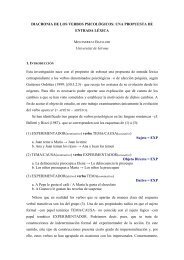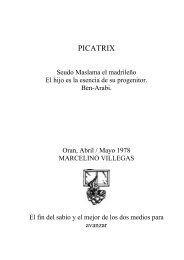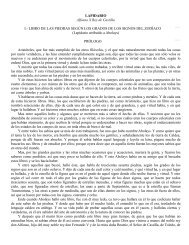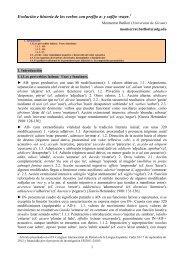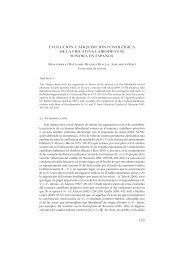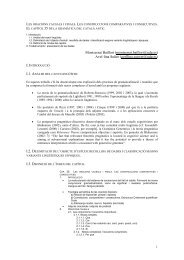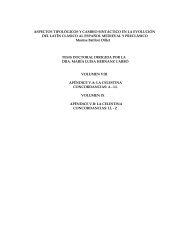La parasíntesis a la luz de los datos históricos de los ... - habilis - UdG
La parasíntesis a la luz de los datos históricos de los ... - habilis - UdG
La parasíntesis a la luz de los datos históricos de los ... - habilis - UdG
You also want an ePaper? Increase the reach of your titles
YUMPU automatically turns print PDFs into web optimized ePapers that Google loves.
<strong>de</strong> 1992, con esa misma marca y remitiendo a aterrorizar; aparece a<strong>de</strong>más terrecer, que<br />
comparte su mismo significado, registrado por primera vez en el DRAE <strong>de</strong> 1803, <strong>de</strong>finido<br />
como «aterrar, causar o inferir terror» y marcado también como anticuado, que en <strong>la</strong> edición<br />
<strong>de</strong> 1914 adquiere una segunda acepción «sentir temor», propia <strong>de</strong> Asturias y León, mantenida<br />
también hasta <strong>la</strong> edición <strong>de</strong> 1992."<br />
3.3. Deadjetivales<br />
3.3.1. Voces con formaciones <strong>la</strong>tinas equivalentes en -SCO con o sin prefijo<br />
Entre <strong>los</strong> <strong>de</strong>adjetivales <strong>de</strong> este grupo se hal<strong>la</strong>n: arronquecer [< RAUCUS ( > <strong>la</strong>t. IRRAUCESCO),<br />
modificado por influjo <strong>de</strong> roncar], amollecer [< MŎLLIS, -E ( > MOLLESCO)], ac<strong>la</strong>reçer [<<br />
CLARUS, -A, -UM ( > CLARESCO / ADCLARO)], aternecer [< TĔNER, -ĔRA, -ĔRUM (> TENERASCO,<br />
ĔRE / TENERESCO, ĔRE)], af<strong>la</strong>queçer [< FLACCUS, -A, -UM (> FLACCESCO / INFLACCEO)],<br />
agran<strong>de</strong>cer [< GRANDIS, -E (> GRANDESCO / INGRANDESCO)], amadurecer [< MATŪRUS, -A, -<br />
UM ( > MATURESCO)], amagrecer [< MĂCER, -CRA, -CRUM (> MACERESCO)], anegreçer [<<br />
NĬGER, NĬGRA, NĬGRUM (>NĬGRESCO)], agravecer [< GRAVIS, -E (> GRAVESCO / INGRAVESCO /<br />
ADGRAVESCO)] y avanecerse [< VANUS, -A, -UM (> VANESCO)].<br />
Todos el<strong>los</strong> son verbos <strong>de</strong> cambio <strong>de</strong> estado y, en su mayoría, po<strong>de</strong>mos afirmar sin<br />
ningún género <strong>de</strong> dudas que son parasintéticos, aunque cabría estudiar mejor <strong>los</strong> casos <strong>de</strong><br />
ac<strong>la</strong>recer ~ c<strong>la</strong>recer ~ enc<strong>la</strong>recer (este último residual), madurecer(se) (22 ejemp<strong>los</strong> en el<br />
CORDE) ~ amadurecer (1 único ejemplo en el CORDE) ~ enmadurecer (2 ejemp<strong>los</strong> en el<br />
CORDE), magrecer (poco usado; documentado hasta el siglo XV) ~ amagrecer (1 único<br />
ejemplo en el CORDE) ~ enmagrecer (<strong>de</strong> mayor uso, 97 ejemp<strong>los</strong> en el CORDE; usual hasta<br />
finales <strong>de</strong>l XVI), negrecer(se) (residual) ~ anegrecer (muy residual) ~ ennegrecer (general<br />
<strong>de</strong>s<strong>de</strong> el XIII), y af<strong>la</strong>quecer(se) (poco usado) ~ enf<strong>la</strong>quecer(se) (<strong>de</strong> uso general) ~ f<strong>la</strong>quecer.<br />
En general, presentan alternancia a- ~ en- (arronquecer ~ enronquecer, amollecer ~<br />
enmollecer, etc.), aunque con distinta frecuencia. En este último caso, por ejemplo, amollecer<br />
se documenta en 74 ejemp<strong>los</strong> <strong>de</strong>l CORDE, mientras que enmollecer se atestigua solo en 27<br />
<strong>de</strong>s<strong>de</strong> mediados <strong>de</strong>l XIV al XVII.<br />
(37)a. <strong>La</strong> gota amollesçe <strong>la</strong> tierra & enb<strong>la</strong>n<strong>de</strong>çe <strong>la</strong>s simientes [CORDE: 1494. Fray Vicente <strong>de</strong> Burgos,<br />
Traducción <strong>de</strong> El Libro <strong>de</strong> Propietatibus Rerum <strong>de</strong> Bartolomé Anglicus]<br />
b. No ignoro que en algunos casos pue<strong>de</strong> dudarse, si <strong>los</strong> vocab<strong>los</strong> son antiquados o mo<strong>de</strong>rnamente no<br />
freqüentados. Pero en tal caso yo siempre estaré <strong>de</strong> parte <strong>de</strong> <strong>la</strong> abundancia <strong>de</strong> <strong>la</strong> lengua i me tomaré <strong>la</strong><br />
licencia <strong>de</strong> usar<strong>los</strong> (...) no culparía yo al que digesse (...) amollecer por ab<strong>la</strong>ndar [CORDE: 1737.<br />
Gregorio Mayans y Siscar. Orígenes <strong>de</strong> <strong>la</strong> lengua españo<strong>la</strong>]<br />
(38)a.Tanto le enmolleçieron el coraçon que, dubdandose que Cleopatra no muries, assi como el<strong>los</strong> <strong>de</strong>zian,<br />
el se torno en Alexandria. [CORDE: 1379 - 1384. Juan Fernán<strong>de</strong>z <strong>de</strong> Heredia. Traduccción <strong>de</strong> Vidas<br />
parale<strong>la</strong>s <strong>de</strong> Plutarco, I]<br />
b. No exercitarse enmollece y afemina [CORDE: c 1619. Luis Cabrera <strong>de</strong> Córdoba. Historia <strong>de</strong> Felipe<br />
II, rey <strong>de</strong> España]<br />
12



